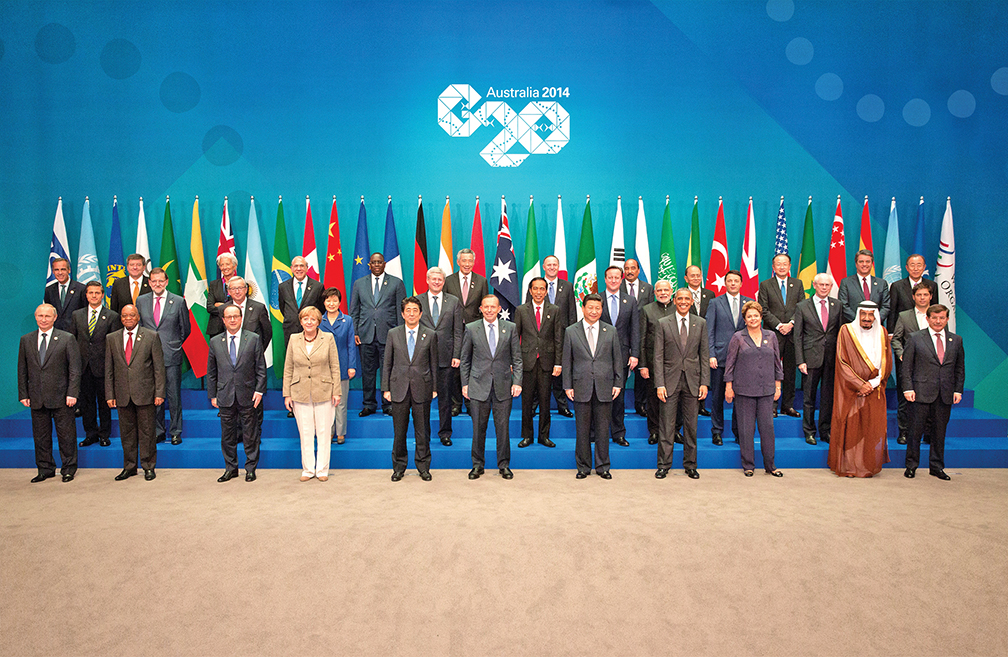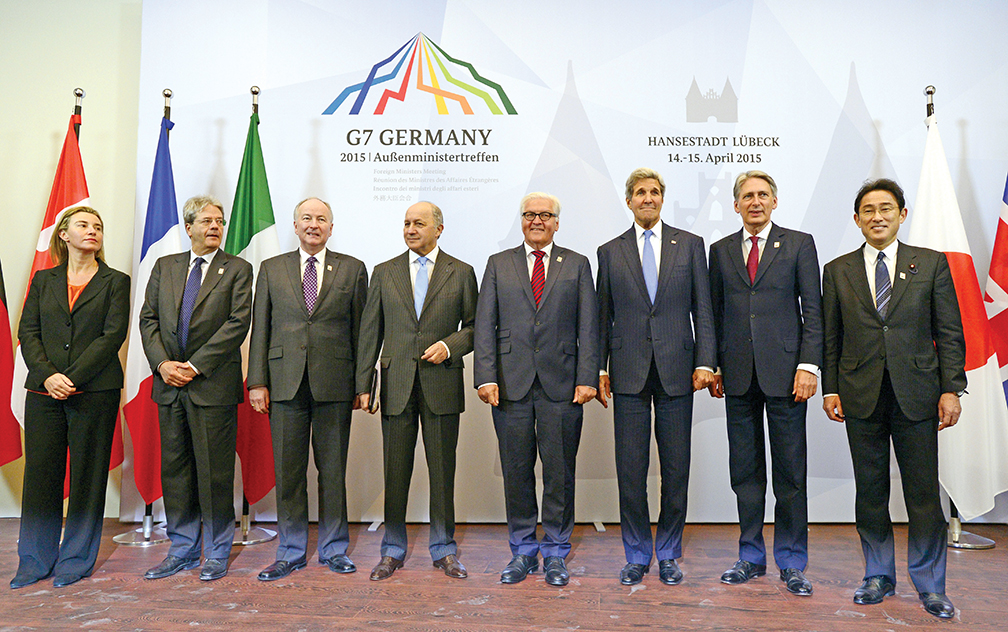The expulsion of Russia provides an opportunity to reinvent the organization
By Alessandro Scheffler Corvaja, research associate, Bundeswehr University, Munich
In preparation for the June 2015 G7 summit, the group’s foreign ministers convened in Lübeck, Germany, in April to discuss the potential nuclear deal with Iran and conflicts in Ukraine and the Middle East. For many commentators, like those at Der Spiegel, this meeting confirmed what they had already argued when the G7 — previously the Group of Eight (G8) — suspended Russia in early 2014 after its annexation of Crimea: that the group is irrelevant and needs Russia to address most of the world’s problems.
In Lübeck, German Foreign Minister Frank-Walter Steinmeier argued that while no one wanted to isolate Russia permanently, it could not be readmitted as long as the conflict in Ukraine continued. But with Russia suspended for more than a year now, it seems unlikely that the prospect of renewed membership will lead Moscow to modify its policies toward Ukraine. Are the G7’s days thus over? Or should the group forget about Ukraine and get Russia back on board?
The return of the G7 has been long overdue, and was the right decision, both as a diplomatic measure and because Russian-Western relations had turned the forum into a highly ineffective talk-shop. Rather than thinking about how and when to readmit Russia, the G7 should start charting its future. The reconstituted G7 will face the challenge of redefining its role in a multipolar world where it is has ceased to be the premier forum of global governance. For the G7 to retain its relevance, Western countries should use it as a forum to coordinate value-based global governance initiatives in larger forums such as the United Nations or the Group of 20 (G20). While the group will thus become less important on geopolitical issues, it can carve out a role for itself in the areas it was founded to address: economics and finance.
The G7 returns
The G7 was founded in 1975 as a forum for the major industrialized economies of Canada, France, Germany, Italy, Japan, the United Kingdom and the United States in reaction to the oil crisis. Though it was a group of the largest economies, it was also a specifically “Western” forum, aimed at producing answers to specific challenges these states faced as a group. While originally only a meeting of finance ministers and heads of central banks, the group quickly expanded to include heads of states and governments.

Russia joined the club in 1998, and it became the G8. Accepting Russia — whose economic significance at the time was not even close to justifying membership — was an explicitly political move aimed at supporting the democratization efforts of then-Russian President Boris Yeltsin. Russia, a young democracy, was offered equal membership in the most exclusive Western organization and recognized as a significant partner. This invitation – extended at a time when the Russian government faced a severe legitimacy crisis at home – was meant to reward Russia for progress made since 1990, but also to encourage it to proceed with democratic reforms. It was inexorably linked to the hope that Russia would at some point become “just another” Western country and thus a natural member of the group.
After 16 years, the Ukraine crisis was not needed to make it clear that these hopes had not been realized. In economic terms, but also in its domestic and foreign policies, Russia has failed to become a pluralistic society. It has failed to protect and promote freedom of the media, free and fair elections, minority rights, rule of law and protection of investments. After the end of the liberalization era, one could increasingly observe how positive trends in these fields were reversed. At the same time, Russian President Vladimir Putin never misses a chance to stress how much he despises “the West” and its societal model.
Russia is not a power that merits the special partnership embodied in the G8 — especially given the rise of other aspiring democracies in the world. If we accept that Russia is — and will remain in the foreseeable future — anything but “just another” Western country and actually appears to have embarked on becoming the premier antagonist of the West, it is clear that Russia should have been ejected from the G8 some time ago. Doing so would have probably saved the group from becoming what it ultimately became: an ineffective forum for the exchange of allegations and animosities between Russia and the West. The strongest sign of how useless the G8 had become was that media commentary centered on how neither Russia, nor the West, would actually lose much of anything apart from prestige.
The G7: too small for the 21st century
The G8 became an increasingly useless exercise as Russia and the other powers grew apart, mainly because the hope of integrating Russia into the Western “club” of liberal democracies had materialized neither in the geopolitical nor the economic or societal sphere. But more than just being ineffective in producing compromises between Russia and the West, the G8’s struggle for relevance was also defined by a much bigger development on the global stage — the dawn of a multipolar world and the so-called Rise of the Rest.
Although the G7 is still called the “group of seven leading industrial nations,” those nations’ leadership is now more contested than when the G7’s predecessor was established in 1975. To be sure, the G7 can still draw on impressive economic power. It includes seven of the 10 countries with the largest gross domestic product (GDP). But the G7, or G8 for that matter, will represent an ever-smaller share of the global population and economy in the future. Countries such as Brazil, China, India and Mexico boast large populations and are already among the world’s largest economies.
When Russia was accepted into the G8, the group’s glory had already begun to fade. The G8 had always faced legitimacy problems, and many had questioned if such an unrepresentative grouping should be the “global board room.” But the ongoing globalization of the world economy also casts doubts on whether it could actually still be that board room. After all, its members were becoming increasingly inept at addressing their own challenges.

Recognition that questions of international finance could not be dealt with sufficiently in this format had already led to the founding of the G20 in 1999. The G20 boasts two-thirds of the world’s population, 85 percent of its GDP and more than 75 percent of global trade and will continue to grow in all three aspects. The G20 has increasingly replaced the G7/G8 as the premier forum of global governance. A turning point was when the U.S. decided to turn to the G20 instead of the G8 to manage the fallout of the financial crisis in 2008-2009.
A new role: Coordinator for global governance
If the G7 will no longer be a forum for cooperation between the West and Russia, and it cannot become the center of global governance, what is its future? The G7 will need to change if it wants to remain relevant. To do so, it should concentrate on its original strength: being a group of like-minded democracies based on common values. Rather than being the premier forum for global governance, the G7 can find a new role as a coordinator for other, more representative forums such as the G20. This will allow the leading market-oriented democracies of the world to speak with one voice on a global level.
Such a role would closely mirror the G7’s founding period; it was first convened to solve the oil crisis and the unravelling of the global economic order after the collapse of the Bretton-Woods system. As forums such as the G20 are more focused on finance and economics than politics, the same should hold true for the G7. And if heads of state and government were not always included, it would also make the group’s meetings less controversial.
While the G7 will — and to a degree already has — shift from being “the network” to becoming a “network among networks,” a continuance of this trend might increase its relevance and effectiveness. But it can do so only if it accepts its more modest role. By proposing models of global governance based on Western values, the G7 can reach out to emerging democracies in the G20. Such a role will become especially important in establishing global economic and trade architecture. With initiatives such as the Transatlantic Trade and Investment Partnership (TTIP) and the Trans-Pacific Partnership (TPP), the West can establish “gold standards” to serve as models of engagement with the G20 countries.
Conclusion
After Russia’s annexation of Crimea and support of separatists in eastern Ukraine, the Western members of the G8 decided to re-establish the traditional format of the G7. While many have seen this mainly as a means of punishing Russia, the return of the G7 should be considered a great opportunity. The old G8 had long run out of steam and primarily become a forum for allegations while struggling to retain its role as the premier forum for global governance.
With the re-establishment of the G7, the largest liberal democracies now regain a forum for informal, intimate exchange, something that had become increasingly impossible with the inclusion of an ever more adversarial Russia. Given the emergence of other global powers and formats for global governance, its role must also change.
The G7 will not be the primary forum for global governance that it once was, but it may become the forum in which the largest liberal democracies coordinate their actions and thus speak with one voice in new forums such as the G20. In this way, the G7 can become the key driver of a global governance based on liberal values. o
Note: This article is based on a paper published by the author as part of the Konrad-Adenauer-Stiftung Working Group of Young Foreign Policy Experts. For the original paper, please see: Working Group of Young Foreign Policy Experts, “The German G7 Presidency (I),” Facts & Findings 156, Konrad-Adenauer-Stiftung, October 2014.


Comments are closed.